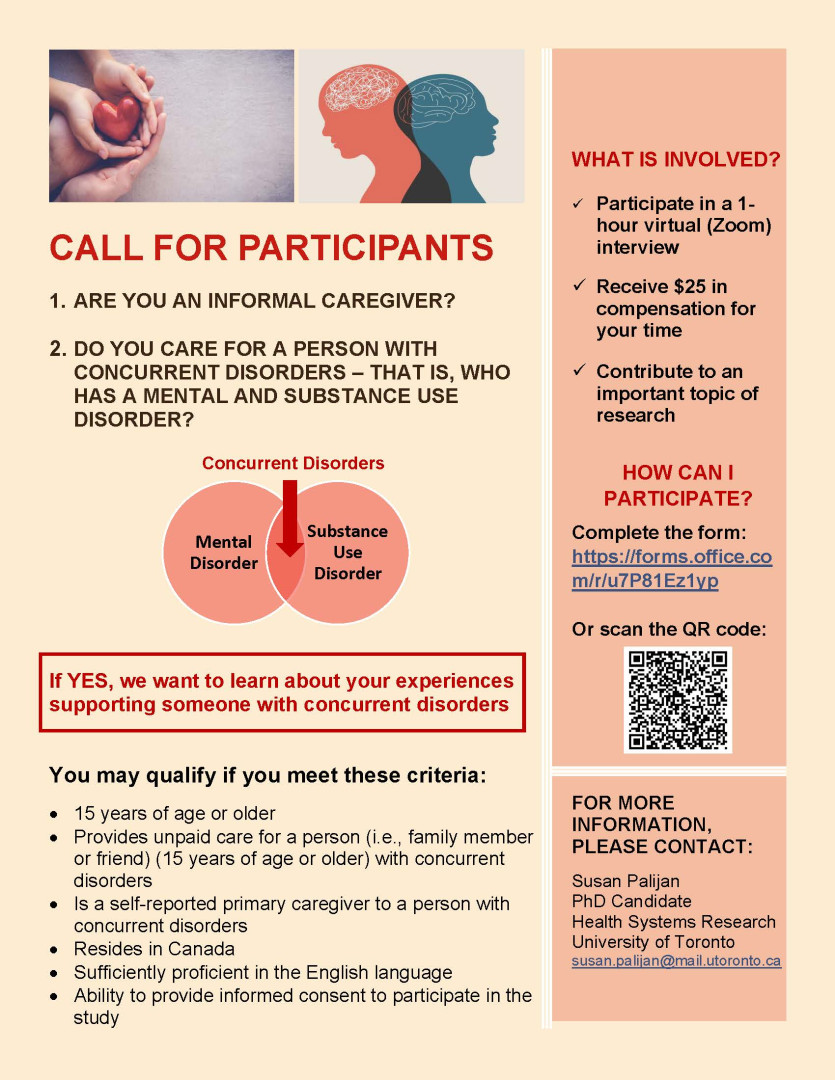• The role of informal caregivers in providing unpaid care for their family members has become increasingly significant. Indeed, a focus on the pressures associated with a care economy (i.e., paid and unpaid care work) in Canada is gaining traction in research and data development (Wray et al. 2023). Moreover, efforts to bring more standardization to Canada’s mental health and substance use systems, the role of caregivers and their own support needs has been recognized as a priority area (Standards Council of Canada, 2024a). In a 2023 national caregiving survey, 1 in 4 caregivers reported fair or poor mental health (CCCE, 2024). Presumably, more challenging issues experienced by care recipients makes the caregiving experience more difficult. Caregivers provide care to family members or friends with a range of physical, cognitive and/or mental conditions (Statistics Canada, 2018) – some more demanding than others. This includes caregivers of individuals with mental or substance use disorders – or both of these disorders concurrently, referred to as concurrent disorders (CD). There is a growing body of literature on caregivers of individuals with mental or substance use disorders, but not on caregivers of individuals with CD.
• Based on a scoping review to understand what is known about caregivers of individuals with CD, there are limited studies on this group of caregivers. As stigma is an important factor, it is not surprising that minimal research is available on this group. However, the recognition and support of these caregivers is paramount. While the literature highlighted some initial interesting findings, they are limited to cross-sectional studies and/or with small samples of non-diverse samples. Indeed, CD as a broad topic of study is said to be currently under-researched and under-funded in Canada (Homewood Research Institute, 2023). Within this broader interest, more attention is required to better understand the experiences of caregivers who support individuals with CD and how it is related to their well-being. Research on this topic can support the development of appropriate policies and programs for this group of ‘invisible’ caregivers. Purpose and Rationale
• The objective of this research study is to understand the experiences and well-being of informal caregivers of individuals with CD across the care journey. The overarching research question is: What are the experiences of informal caregivers of individuals with concurrent disorders across the care journey? An exploratory qualitative descriptive study is proposed to provide a rich description of the experiences of informal caregivers of individuals with CD. In addition, a description of the characteristics and well-being of these caregivers will be developed through the collection of questionnaire data.
•There are research, practice and policy implications to this study. First, the findings will add to the knowledge base on an understudied topic. Second, the findings will provide insight on the types of resources, supports and/or treatments needed for informal caregivers of individuals with CD. Third, the findings can inform the development of strategies, programs and/or policies at the local, provincial and national levels. There may also be systems level implications such that efforts to integrate mental health and addictions services and/or sub-systems should address the unique needs of caregivers of individuals with CD. Finally, the findings can inform the national caregiving strategy for Canada (CCCE, 2024b) by bringing awareness to the needs of these caregivers.
What Does The Study Involve?
The purpose of this study is to understand the experiences and well-being of informal caregivers of individuals with concurrent disorders across the care journey. For the purposes of this study, informal caregivers are individuals (15 years or older) who provide unpaid care to an individual (15 years or older) with both mental and substance use disorders. Eligible participants will be invited to participate in a 60-minute virtual interview and will be asked approximately 10-15 questions about their current mood, experiences as an informal caregiver to an individual with concurrent disorders, what it's like to care for this individual and how this experience has impacted them. They will be compensated for their time. The information from this study will be used to provide insights on the types of resources, supports and/or treatments needed for informal caregivers of individuals with concurrent disorders.
Principal Investigator
Susan Palijan
Who Is Needed?
Research Objectives
Study End Date
Oct/01/2025
The eligibility criteria for this study are as follows:
- An informal/unpaid caregiver,
- 15 years of age or older
- Provides unpaid care for a person (i.e., family member or friend) (15 years of age or older) with concurrent disorders
- A self-reported primary caregiver to a person with concurrent disorders
- Resides in Canada
- Sufficiently proficient in the English language
- Able to provide informed consent to participate in the study.



